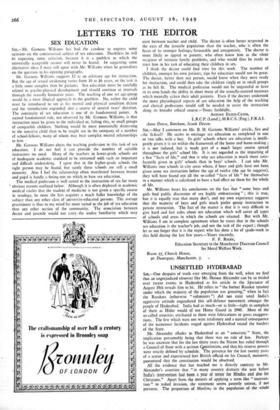LETTERS TO THE EDITOR
SEX EDUCATION
Sut,—Mr. Garcons Williams has had the candour to express some opinions on the controversial subject of sex education. Doubtless he will be expecting some criticism, because it is a problem to which the universally acceptable answer will never be found. In suggesting some alternative ideas I must still agree with Mr. Williams when he generalises on the question in his opening paragraphs.
Mr. Garnons Williams suggests 12 as an arbitrary age for instruction. But the age of sexual awakening varies from 10 to ,16 years, so the task is a little more complex than he pictures. Sex education must be carefully related to psycho-physical development and should continue at intervals through the sexually formative years. The teaching of one set age-group would be a most illogical approach to the problem. No, rather the child must be introduced to sex as his mental and physical condition dictate and the introduction expanded into a course of several years duration. The continuity of sex education is one of its fundamental points. A second fundamental rule, not observed by Mr. Garnons Williams, is that instruction must be given to the individual or, failing this, to small groups of compatible children. Nothing would be more emotionally distressing to the sensitive child than to be taught sex in the company of a number of school-fellows, many of whom may bear complex mental relationships to him.
Mr. Garnons Williams elects the teaching profession to this task of sex education. I do not feel it can provide the number of suitable instructors we need. Many of the teachers in lower-grade schools are of inadequate academic standard to be entrusted with such an important and difficult undertaking. I agree that in the higher-grade schools the right person may be found, but surely these schools are still a small minority. Also I feel the relationship often manifested between master and pupil is hardly a fitting one on which to base sex education.
The medical profession is well suited to the instruction of sex for many L obvious reasons outlined below. Although it is often deplored in academic medical circles that the student of medicine is not given a specific course in sexology, he none the less acquires a much fuller knowledge of the subject than any other class of university-educated persons. Thc average practitioner is thus to my mind far more suited to the job of sex education than any other section of the community. The association between doctor and juvenile would not carry. the undue familiarity which may exist between teacher and child. The doctor is often better respected in the eyes of the juvenile population than the teacher, who is often the focus of its stronger feelings,%favourable and antagonistic. The doctor is more likely to appeal to parents, who often know him as the silent recipient of intimate family problems, and who would thus be ready to trust him in his task of educating their children in sex.
I think the doctor could find time for this work. The number of children, amongst his own patients, ripe for education would not be great. The doctor, better than any person, would know when they were ready for instruction, and could then take the children singly or in small groups as he felt fit. The medical profession would not be ungrateful to have in its own hands the ability to abort many of the sexually-centred neuroses which mentally sicken their adult patients. Even if the doctors undertook the more physiological aspects of sex education the help of the teaching and clerical professions would still be needed, to assist the instruction along its broader ethical course.—Yours faithfully,
ANTONY ESSEX-CATER,
L.R.C.P. (Lond.), M.R.C.S. (Eng.), F.R.A.I. Aune Down, Bantham, South Devon.






























 Previous page
Previous page